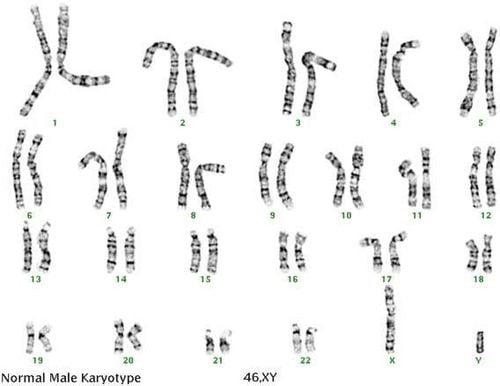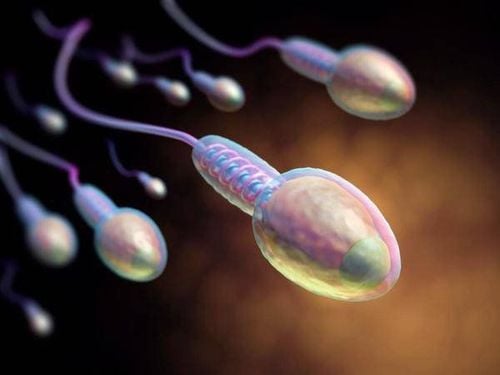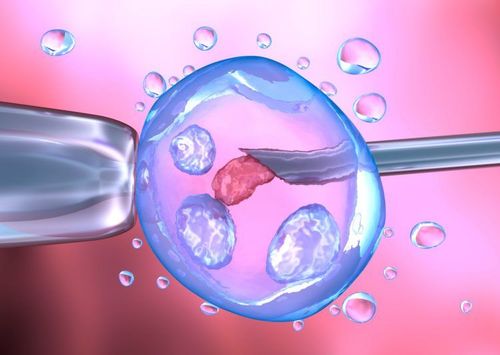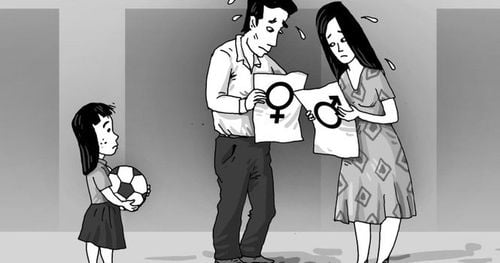This is an automatically translated article.
The article was professionally consulted by Specialist Doctor II Cao Thi Thanh - Pediatrician - Department of Pediatrics - Neonatology - Vinmec Hai Phong International General Hospital. Dr. Thanh has worked for 25 years in the treatment of neonatal pediatric diseases.Intersex is a term that refers to sexual and physiological atypical tendencies. Signs are abnormalities of the external genitalia and internal reproductive organs, which can cause the child's sex to not be clearly expressed.
1. What is Intersex?
Intersex or intersex is a term used when someone is born with a gender identity that does not fit the usual definition of a boy or a girl. An intersex child may have internal genitalia, external genitalia, chromosomes, or other biological signs that are different from typical male or female patterns. These manifestations are sometimes referred to as differences of sex development (DSD).An intersex baby may have the following signs:
Appearance of female sex on the outside but mostly male anatomy on the inside, or vice versa Have genitals of unknown sex male or female Some cells have a female sex chromosome (XX) and some cells have a male sex chromosome (XY). (Normally, all girls' cells have XX chromosomes, and all boys' cells have XY cells.) This happens more often than we think. . Statistics show that about 1 in 2,000 children have DSD, including those with variants that will not appear at this stage but may appear later in life.
Bisexual or bisexual children are not the same as transgender. Therefore, it is often difficult to determine the sex of an intersex child. If an intersex person feels that the gender they were assigned at birth doesn't match their gender identity, they may switch to a gender that better fits their gender identity.
Children with DSD often need additional medical and psychological support, but intersex children can still grow up to be healthy, well-adjusted adults.

2. How to detect intersex status
Parents often find out that their child is intersex at birth, but this is not always the case. Healthcare providers will sometimes be provided with information that detects atypical sex development during fetal ultrasound before a baby is born.Furthermore, the condition can also detect a child with DSD months or years after birth, such as in infancy or puberty. However, in exceptional cases, some children do not realize their DSD status until adulthood, and others never find out.
Trắc nghiệm: các chỉ số cần chú ý về sự phát triển thể chất của trẻ
Chiều cao, cân nặng của bé ở từng giai đoạn nên là bao nhiêu là bình thường, bao nhiêu là bất thường? Cùng ThS.BS Ma Văn Thấm điểm lại xem bạn đã nắm được các chỉ số phát triển thể chất của bé chưa nhé!The following content is prepared under supervision of Thạc sĩ, Bác sĩ y khoa, Ma Văn Thấm , Nhi , Phòng khám Đa khoa Quốc tế Vinmec Dương Đông(Phú Quốc)
3. Manifestations of intersex status
If your baby is identified at birth as likely to have DSD, your doctor will likely let you know, but he or she may not be able to diagnose a specific type of DSD right away. To get a specific diagnosis of DSD, a child may need to have a number of tests including chromosomal tests, hormone tests, and MRI or ultrasound scans of the internal genitals. It can take a few days for test results to be available, and even then, a definitive diagnosis is not always possible.Most DSDs are not a health threat and medical intervention is usually not needed. However, in some cases, an intersex child with a certain condition may need surgery or medication to prevent serious medical problems and protect their health.
Many large hospitals have DSD management teams/teams that meet with parents after the baby is born to guide treatment indications and provide counseling and support. These groups include specialists such as geneticists, urologists, pediatric endocrinologists, pediatric gynecologists, and psychologists. DSD experts agree that working with these groups is the best way to care for intersex children.
Unfortunately, not all hospitals have this DSD team. If your hospital does not offer this type of specialized treatment or if you are not satisfied with the contents they provide, find a DSD specialist care center that is right for your needs. It's important to find health care providers with the experience and support to help you determine the best path for your child, including how (or if) to sex your child.

4. Purpose of sex determination for intersex children
A team of experts on DSD will address your transgender questions. It's best to wait until you get the results of any tests before making any decisions. This helps you better understand your child's condition. Doctors sometimes use this information to predict whether your baby is likely to be identified as a boy or girl as she grows.Gender assignment is a reversible decision that helps you raise your child according to social and legal norms. Nor is it necessary to ask your children to undergo sex surgery to make them look more like a boy or a girl.
Legally, parents must specify male or female gender on their child's birth certificate. However, in California and Washington have both begun offering a third gender option, called "X" on birth certificates.
5. How parents can make decisions with children with intersex When you have an intersex child it can cause stress and discomfort. You may be worried about your children's health and you always question whether they are socially acceptable. Not only that, but you also have concerns about your ability to raise a different child.
More than that, you may feel pressure from family, cultural norms, and sometimes from health care providers to make decisions about sex and surgery quickly.
You will not be alone in making this decision. Because you can find and reach out to other parents who have faced similar challenges that you are currently facing, and seek support from these parents that will help you cope. A good guide to psychological preparation when dealing with your child's diagnosis.
Some conditions of DSD status require early surgical intervention to help optimize health and fertility. For example, a doctor may recommend removing underdeveloped sex organs caused by a chromosomal condition because they can increase a child's risk of cancer. A girl has a condition where the urethra and vagina share an opening (urogenital sinus) and so a vaginal opening is required for her to have her period.

Other organizations are still reviewing the evidence that early gender reassignment surgery is optimal. The American Academy of Pediatrics says that parents should understand the risks and benefits of any course of action affecting their child. The American Medical Association is reviewing a proposal that discourages this surgery on young children.
Some doctors and organizations say reconstructive surgery for intersex babies should still be an option for parents. For example, the CARES Foundation does not condemn surgery as long as the child is medically stable and the parents are fully informed and a good surgeon has been found.
Most surgery to change a child's genitals so that they look more like a girl or a boy is considered plastic surgery. In the past, this type of surgery was done frequently on intersex babies.
Today, parents are increasingly encouraged to delay making a decision about plastic surgery until a child is older.
Here are some reasons to delay or forgo reconstructive surgery on your intersex child:
The surgery is difficult to reverse: If your child is not satisfied with the assigned sex, the process Reversals will be much more difficult if they are operated on. Your child may be considered for surgery and what type of surgery if you delay making a decision until they are older. Then your child will have to live with that decision. Advances in technology mean that surgical techniques are constantly evolving. If you wait, it is possible that the surgical procedures for your child's condition will improve. Surgery is often unnecessary: Many adults with DSD have surgery as children, and they condemn it. Surgery can have painful lifelong consequences including medical complications and loss of sexual sensitivity. Make sure you understand these potential risks when considering surgery for your child. People with DSD can still live happy, fulfilling lives without undergoing surgery.

6. Some examples of intersex conditions
There are many types of DSD, but some of the more common include:Mixed genitourinary disorder (MGD): This condition is caused by a chromosomal difference (mosaic), where several chromosomes are XY (male) and some are XO - which means they are missing a second sex chromosome. This results in the child being born with one testicle and an underdeveloped sex organ. Children with this condition may need hormone treatment and regular monitoring of their growth and development. Androgen Insensitivity Syndrome (AIS): People with AIS are genetically male (meaning they have an XY chromosome), but their bodies are resistant to sex hormones for male development gender. This causes the growth of the genitals to be completely or partially female. A child with complete AIS is genetically male but looks like a girl. (This condition is often not discovered until much later.) Babies with partial AIS may have both male and female genitalia, such as a large clitoris or testicles that have not yet descended into the scrotum. Micropenis: Boys born with very small penises are said to have micropenis. There is no unified criterion for what constitutes a micropenis, but in a newborn boy it usually means a penis less than 1.9 cm long when gently stretched. A micropenis can occur alone or in combination with hormonal or other disorders. Congenital adrenal hyperplasia (CAH): People with CAH produce extra male sex hormones called androgens and have difficulty producing other hormones. Girls (babies with female chromosomes) with CAH may have an enlarged clitoris or male-looking genitals. CAH can be life-threatening and requires lifelong treatment, such as hormone replacement. It depends on your child's condition and the healthcare provider's expertise. In general, you'll want to know:
7. Psychological problems of intersex children
Long-term research on the emotional state of people with DSD is scarce. However, psychologists know that feelings of shame and rejection have negative effects on people's mental health, while feelings of support, recognition, and understanding are beneficial. In other words, creating a loving and supportive environment for your child can help ensure they grow up confident and content.Talk to your DSD team about the challenges to expect and how to navigate them, and consult a mental health professional about the best way to support and talk to your child. As adults with DSD can attest, intersex children can go on to live happy, healthy, and productive lives.
Pediatrics department at Vinmec International General Hospital is the address for receiving and examining diseases that infants and young children are susceptible to: viral fever, bacterial fever, otitis media, pneumonia in children, ... With modern equipment, sterile space, minimizing the impact as well as the risk of disease spread. Along with that is the dedication from the doctors with professional experience with pediatric patients, making the examination no longer a concern of the parents.
Please dial HOTLINE for more information or register for an appointment HERE. Download MyVinmec app to make appointments faster and to manage your bookings easily.
Reference source: babycenter.com















